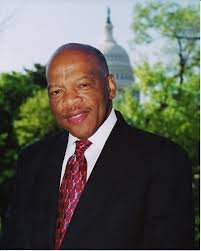Congressman John Lewis to speak at Lincoln University’s 160th Commencement
Style Magazine Newswire | 4/18/2019, 4:07 p.m.
Lincoln University, Pa. – U.S. Rep. John R. Lewis, a prominent civil rights leader and representative of Georgia’s 5th congressional district, will speak at Lincoln University’s 160th Commencement ceremony Sunday, May 5.
“John Lewis’s legacy as a civil rights leader and legislator aligns with the values and mission of Lincoln University, which is to educate and empower students to lead their communities and change the world,” said Lincoln University President Brenda A. Allen. “It is our hope that graduates and those in attendance at the ceremony will be inspired by the heartening words of Congressman Lewis.
Lewis assumed office January 3, 1987, and has been serving Georgia’s 5th District in the United States House of Representatives for the past 30 years.
He is a member of the House Ways and Means Committee and is the chair of the Subcommittee on Oversight. Rep. Lewis is the senior chief deputy democratic whip and is often referred to as the “conscience” of the United States Congress.
Born in 1940 to sharecroppers in Troy, Alabama, Lewis was raised during the era of Jim Crow law — a series of laws that enforced racial segregation in the South. After being Inspired by the Montgomery Bus Boycott and words of Rev. Martin Luther King Jr., Lewis joined the civil rights movement.
During his time as a student at Fisk University, Lewis organized sit-in lunch demonstrations, and in 1961 joined the infamous Freedom Riders, who protested segregation by occupying bus seats reserved for whites. Bus riders were routinely attacked by violent mobs, leading to Lewis being arrested and beaten.
Lewis also served as chairman of the Student Nonviolent Coordinating Committee and was one of the leaders who organized the 1963 March on Washington, where he gave a keynote address. A year later he participated in voter registration drives in Mississippi and in 1965 joined other civil rights leaders and led more than 600 marchers in Selma, Alabama. Lewis and the marchers were met with violent protest from police. The march received national attention and is credited with influencing the passage of the Voting Rights Act of 1965.
Throughout his efforts during the Civil Rights Movement, Lewis sustained arrests, imprisonments, and beatings that lead to severe injuries.
Before being elected to Congress, Lewis served in the Carter administration, leading a federal volunteer organization, and later served as a member of the Atlanta City Council.
Lewis is the author of numerous books and has received a National Book Award for his trilogy MARCH. He is also the recipient of numerous awards including the Presidential Medal of Freedom, the Lincoln Medal, and the Gleitsman Citizen Activist Award from the Harvard Kennedy School among others.
Kilson to be awarded honorary degree
Dr. Martin L. Kilson, Jr. ’53, a Harvard University professor emeritus, will receive an honorary degree at Lincoln’s commencement ceremony. In 1969, Kilson became the first African American scholar to receive a full professorship at Harvard College.
Kilson was born on February 14, 1931, in East Rutherford, New Jersey to Reverend Martin Kilson and Louisa Kilson. After his family’s move to Ambler, Pennsylvania, Kilson attended Ambler High School, where he graduated as an honor student in 1948.
In 1953, Kilson graduated from Lincoln University at the top of his class with a bachelor’s degree in political science. After graduation, Kilson continued his education and earned a John Hay Whitney Fellowship to study at Harvard University where he earned a Ph.D. in Political Science.
After completing his doctorate degree, Kilson earned a Ford Foundation Fellowship and conducted field research in West Africa. Kilson then returned to Harvard as a research associate in the Center for International Affairs and was appointed a lecturer in Harvard’s Department of Government in 1962. Shortly after, he published his first book titled Political Change in a West African State: A Study of the Modernization Process in Sierra Leone.
During his tenure at Harvard, he wrote over 100 journal articles and co-authored several books that addressed effective political leadership and socio-economic issues for African Americans and emerging countries in Africa.
In 1975, he received a Guggenheim Fellowship and was instrumental in the development of African American studies both as an academic discipline and as a department at Harvard University.









